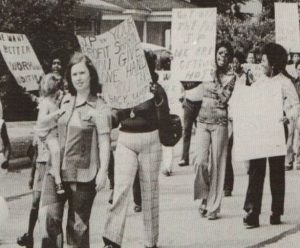 Joey Fink, a PhD candidate in History and current McColl Fellow at CSAS, will present findings from her dissertation research titled “In Good Faith: How Millhands, Feminists, Preachers, and Nuns Built a Workers’ Rights Coalition in the 1970s South.” Lunch will be be provided.
Joey Fink, a PhD candidate in History and current McColl Fellow at CSAS, will present findings from her dissertation research titled “In Good Faith: How Millhands, Feminists, Preachers, and Nuns Built a Workers’ Rights Coalition in the 1970s South.” Lunch will be be provided.
In 1974, something extraordinary happened in Roanoke Rapids, North Carolina. A majority of the 3000 workers at the J.P. Stevens textile mills voted for union representation. After a decade of unsuccessful organizing drives throughout the recently integrated southern mills, union activists had a small victory that they hoped would have a domino effect in the mostly unorganized southern textile industry. But Stevens stalled on negotiations over a contract in the following years, and the union faced a dilemma. A courtroom battle would be costly and prolonged; a strike was out of the question.
 That’s when civil rights activists, unionists, working-class men and women, feminists, and religious leaders came together in a diverse coalition in support of the Stevens workers. The coalition preached from the pulpit, in the aisles of department stores, and at stockholder meetings that the struggle for a contract was a human rights struggle. The coalition mounted a successful public shaming campaign against Stevens, and their most powerful weapons were the stories of the women at the center of the struggle. From the Catholic nuns who went undercover as workers in the mills to the African American women who filed a class-action discrimination lawsuit against Stevens to the elderly white women who testified before Congress, the stories of these many “Norma Raes” united a diverse group of activists together, garnered enormous public support, and forced the nation’s second-largest textile corporation to negotiate with its workers in good faith.
That’s when civil rights activists, unionists, working-class men and women, feminists, and religious leaders came together in a diverse coalition in support of the Stevens workers. The coalition preached from the pulpit, in the aisles of department stores, and at stockholder meetings that the struggle for a contract was a human rights struggle. The coalition mounted a successful public shaming campaign against Stevens, and their most powerful weapons were the stories of the women at the center of the struggle. From the Catholic nuns who went undercover as workers in the mills to the African American women who filed a class-action discrimination lawsuit against Stevens to the elderly white women who testified before Congress, the stories of these many “Norma Raes” united a diverse group of activists together, garnered enormous public support, and forced the nation’s second-largest textile corporation to negotiate with its workers in good faith.
